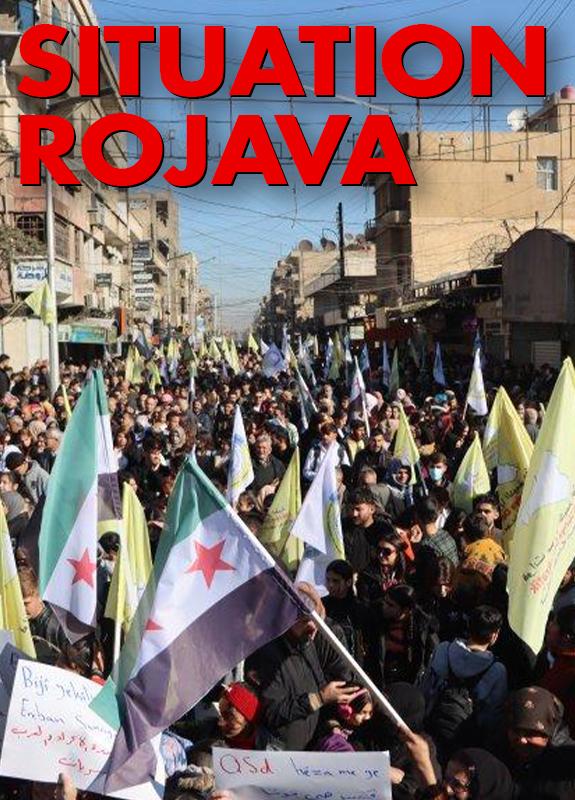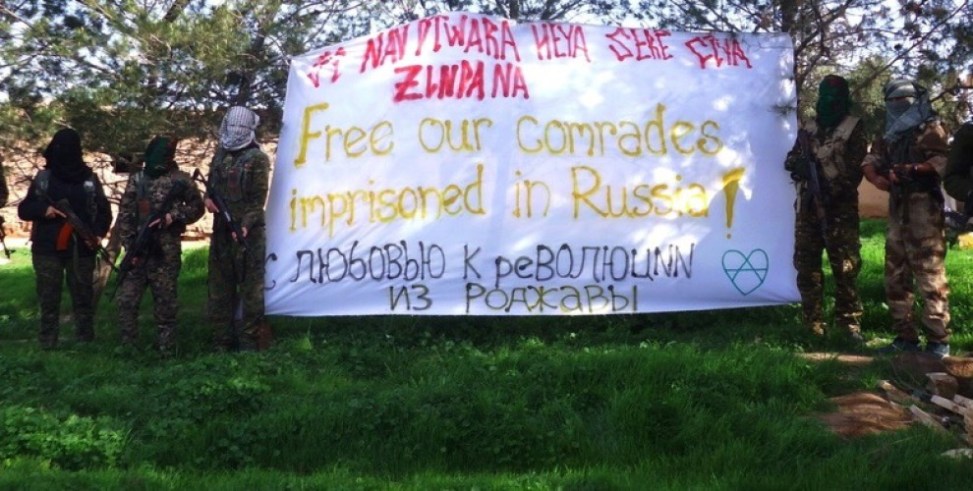This article was written for the magazine of UCL on April 2025
Introduction
Rojava is a place of attention for many libertarian socialists, with anarchist organizations from all over the world supporting and discussing the developments of north-east Syria for over a decade. The developments of the last months are opening a new chapter for Syria. This also has very serious implications for the revolutionary process in the north. In this article we will share facts and also our opinions on the recent agreements between Mazlum Abdi, commander in chief of SDF, and Ahmed al-Shara, Chief of HTS and interim president of Syria. We will briefly contextualize recent developments of the last months, but won’t extend on that since many other articles have already been written.
The offensive that changed Syria
The military offensive that started at the end of November 2024 surprised many. The ranks of the Syrian Arab Army, encircling Idlib to contain the armed forces that fought the Assad regime for more than a decade, collapsed in matter of days under the advance of the Islamist forces of HTS. We won’t dive much on military or geopolitical aspects, but the local production of Shaheen kamikaze drones that supported HTS offensive is one of the key elements of their victory. The full support of Turkey, as well as the tacit agreement of western powers for their offensive, is without any doubt another key element to understand the success of their offensive.
In less than a week they took control of Aleppo, the second biggest city of Syria. Most of the regime soldiers did not fight back, running away as soon as the enemy got close to their positions. After Aleppo, the offensive continued towards the next important cities, Hama and Homs, which easily fell under control of the insurgent advance. Another front opened in the south, that started to advance towards Damascus. With the southern front entering the capital, and the northern one getting close, Bashar al-Assad fled to Moscow marking the end of more than 60 years of al-Assad dynasty.
The collapse of the Assad regime was celebrated all around Syria, including the territories of the Democratic Autonomous Administration of North-East Syria (DAANES), where statues of Bashar al-Assad and his father Hafez al Assad were toppled down as the regime soldiers abandoned their positions. SDF negotiated with the remaining regime soldiers to take control of several military positions before they abandoned them, making sure that ISIS, still active in the desert areas of central Syria, didn’t get hold of a big stockpile of weapons and advanced military equipment. SDF took control of the city of Deir Ezzor, as well as the gas and oil fields of southern Raqqa, to negotiate later a transfer of the military presents to the provisional government that took control of the capital.
After entering Damascus, HTS imported the “Syrian Salvation Government”, a local government that was ruling Idlib, and supplanted with it the central government, becoming the de facto the new central administration of Syria. This didn’t effect the administration of DAANES in the north and east Syria, and it also had little to no effect to other areas with strong local administrations like the Durze community in Suweyda, in southern Syria. The regions of Tartus and Latakia, with an Alawite population majority that have been the strongholds of the Assad regime, also did not easily accept the new central administration. A wave of insurgency against HTS fighters erupted in the following months in those areas, following massacres and desecration of sacred Alawite places from the Sunni Islamist groups.
The offensive that topple down the regime got a lot of international attention, but not so much was said about the other war that was fought in parallel to that. The Syrian National Army (SNA), a Turkish armed, trained and paid proxy force in Syria, has been waging a war against SDF. They managed to capture the city of Manbij, planning to take also Kobane and the rest of kurdish regions, hoping for the collapse of the DAANES. But SDF did not collapse as the Syrian Arab Army, it stopped the Islamist Turkish proxies on the shores of the Eufrates River. The bridge of Qereqozah, connecting Manbij and Kobane regions, and the Tishrin dam over the same river, became the choke points were SDF broke the advance of SNA. Dozens of attacks from the different Islamist groups aligned with Turkey were sent to cross those strategic bridges, but they couldn’t advance in the face of the fierce resistance of SDF. The banner with the slogan “No passaran” that hung in Madrid on the Spanish revolution would fit much better to what happened on the Tishrin resistance, were wave after wave of enemy forces were crashed by the anti-fascist resistance that has managed to keep control of the Dam.
The resistance of Tishrin would not have been possible if it was not for thousands of civilians that traveled there, defending the dam and denouncing the brutal aggression of Turkish attacks. More than 20 civilians were killed in the constant drone strikes and shelling, but this did not deter the people of North-East Syria to keep going to defend the dam. This combination of civilian resistance in the dam, together with the military defense in the surrounding areas, made possible to break the offensive of the Turkish proxies. The Neo-ottoman aspirations of the Turkish government, that hoped to take control of northern Syria at the same time as HTS took hold of Damascus, have been foiled by the resistance and determination of the people of north and East Syria.
Negotiations between SDF and HTS
The negotiations between SDF and HTS have been an important element to understand how the situation unraveled. Before the offensive, some commercial agreements existed to coordinate exchange of oil, gas and other supplies between HTS controlled territories and areas of the DAANES. When the offensive started, the forces defending the historic Kurdish neighborhoods of Aleppo (Sheikh Maqsoud and Ashrafiya) became a critical topic. When the Assad regime asserted control of the city in 2016, Kurdish forces defended those neighborhoods, affirming their autonomy and connection with the rest of territories of the DAANES. Since then, the neighborhoods co-existed with the regime control of the city, not fighting them but not letting them access inside the Kurdish areas. When HTS fighter started to enter Aleppo, Russian envoys tried to convince the SDF to fight alongside the regime, but SDF refused. Allegedly, some agreements of non-aggression were made between HTS command and SDF command, and after HTS fighter took control of the Aleppo and started moving to Hama without clashing with kurdish forces, it seem clear that neither HTS or SDF had intentions to fight each other, hoping for the collapse of the regime and the possibility of understanding in a post-Assad Syria.
After Assad left, al-Jolani, leader of HTS, dropped his jihadist nome de guerre and used again his legal name, al-Sharaa, in the interviews he avidly gave to western journalists. He had a very controlled media strategy, portraying himself as a moderate and rational Syrian rebel, downplaying his role in the ranks of Jabat al-Nusra as Syrian branch of al-Qaeda calling now for an inclusive and democratic Syria. Western propaganda helped him to spread this image of strong man, and he rapidly changed his green military shirt for a suit and tie, promising to respect the diversity of Syria and to not wage war against christians or kurds. On their side, the official building of the DAANES also raised the independence flag, signifying the will to be part of the transitional process of the new Syria. The SDF also made important concessions, withdrawing from the city of Deir Ezzor and from the gas and oil fields of southern Raqqa allowing the forces of the new provisional government to take control of those areas. Those movements paved the road to the agreements that were signed on March 10 between Mazlum Abdi and Ahmed al-Shara in the presidential palace of Damascus. The documents signed included a list of 8 points, establishing the foundations for future negotiations and agreements:
1 – Political Participation – Full representation and rights for all Syrian communities, including Kurds, in state institutions based on merit rather than sectarian or ethnic background.
2 – Kurdish Rights – Recognition of the Kurdish community as an integral part of Syria, ensuring constitutional rights and citizenship protections.
3 – Security and Stability – A ceasefire across Syrian territories, aiming to reduce hostilities and facilitate political dialogue.
4 – Institutional Integration – The merging of all civil and military institutions in northeast Syria into the national framework, including border crossings, airports, and energy resources.
5 – Refugee Return – Guarantees for the safe return of displaced Syrians to their homes under government protection.
6 – Sovereignty Protection – Joint efforts to counter external threats, including armed groups and foreign interventions that destabilize Syria.
7 – Combating Extremism – Enhanced cooperation in counterterrorism efforts against ISIS and other extremist factions.
8 – Ending Division and Sectarian Rhetoric – Rejecting hate speech and ensuring national reconciliation.
These points are quite open, expressing a common understanding to continue negotiations more than concrete steps on how to do it. Committees have been created to asses further steps on how to put in practice those agreements, expecting to reach concrete proposals for the end of 2025.
The first significant step to implement those agreements has been the withdrawal of YPG and YPJ from the Kurdish neighborhoods of Aleppo, that started on April and is planned to take place in three phases. The Assayish (local security forces) will remain in the neighborhoods, with promises of being integrated in the internal security structures of the Aleppo. A reduced number of military checkpoints of the provisional government are allowed in the neighborhood as the YPG and YPJ checkpoints are dismantled, removing also the rest of physical barriers and barricades that were raised by the Kurdish people to defend their homes. All citizens of Aleppo will have freedom of movement and no extra road blocks will be raised, the blockade that was imposed also during the last years of the Assad regime is over and trade is normalizing. The negotiations also included and agreement for exchange of prisoners between both sides, the first two exchanges already took place without incidents at the time of writing this article. This makes the Aleppo process a potential blueprint for normalization of other contested areas.
How does agreements affect the revolution?
The first thing that may need clarification is why the commander of SDF, a force with more than a 100.000 fighters, traveled to Damascus to sign an agreement with the leader of HTS, with a force estimated of 30.000 fighters. To understand this we also need to count the influence of Turkey, who not only controls the SNA (with an estimated force of around 60.000 fighters) but that also holds the key for western governments to negotiate with Damascus. The government of Erdogan has been working as the liaison between the head of HTS and representatives of western governments as well as other Arabic countries. Turkey has been a key ally of HTS for several years, and Turkish military points around Idlib functioned as a deterrence for the Syrian Arab Army to enter Idlib with full force. This allowed HTS to consolidate their forces and prepare the offensive that provided the final blow to the decrepit regime of Bashar al-Assad.
Turkish support for HTS is not exempt of contradictions, and over the last months there have been some tensions and disputes over different topics. Nevertheless, their alliance is deep, and several representatives of the provisional government have strong ties with Turkish State. One of the most prominent examples is the new Syrian minister of foreign relations, Assad Hassan al-Shaibni, who just finished his PhD on political science and international relations in the Istanbul Sabahattin Zaim University on 2024. The Grand Mufti of Syria and newly appointed leader of the Supreme fatwa council, Osama al-Rifai, also has close ties with Erdogan and his circles, being also aligned with the Muslim Brotherhood. Many commanders of the SNA divisions are being appointed for important positions in the new Syrian army, like Abu Amsha, leader of the Hamza division, group responsible for the assassination of the Kurdish politician Hevrin Xalef in 2019. All these names are just some examples of how far the influence of Turkish government is penetrating the new Syrian state, harvesting their investment and the protection that was given to HTS over the last years of Bashar al-Assad.
This massive influence of Turkish ruling elites over Syria creates a big threat for the DAANES. Erdogan Neo-Otoman expansionist dreams, combined with his war against the Kurdish Liberation Movement, made the annihilation of the autonomous zone of Rojava a priority for the Turkish State. Negotiations with the new provisional government of Damascus seemed the only alternative to prevent a full scale war against Turkey. Ahmed al-Sharaa, self-appointed president of Syria, is not fond of his dependency on Turkey, and making agreements with Syrian forces reaffirms his nationalist narrative of “Syria for the Syrians”. This also comes at a time when Israel is also expanding its influence on southern Syria, expanding their “security zone” beyond the already occupied Golan highs. The rise of a new state after the collapse of a regime is always a weak time for any ruler, and he needs all alliances he can rally to consolidate his power grip. Kurdish forces are also not fond of how al-Shara is expecting to rule Syria, and all the DAANES institutions already express their deep disagreement on the new constitution proposed by the provisional government. Nevertheless, making concessions to the new proclaimed president of Syria now, can bring opportunities to ensure some autonomy for the future.
One of the key points of the agreements is the right to return of displaced population. This has direct implications for the people of Afrin, occupied by Turkish proxies on 2018, as well as the M4 highway strip between Serekaniye and Gire Spi, also occupied since 2019. As Turkish proxies are integrated in the new Syrian army, the territories they occupied are expected to follow a similar process as what is happening in Aleppo. Most fighters of this Islamist groups are themselves displaced population from all over Syria, that after the fall of the al-Assad regime are also hoping to return to their homes. This opens the door for the displaced Kurdish people of Afrin and Serekaniye to return to those historic Kurdish territories, probably under agreements of a demilitarized zone without SDF presence but with Kurdish Asayish security forces. As for now, many families from Afrin are already returning as Islamist gangs are slowly abandoning the area. Some military contingents connected to the provisional government will probably have presence in the region, but the brutalities like kidnappings, executions and looting of kurdish houses that has been taking place since the occupation of 2018 will probably not continue at the same level.
Another important point of the agreement is the recognition of Kurdish identity. Until now the official name of Syria was “Syrian Arab Republic”, excluding other minorities that lived in the country for milenia. One of the most visible aspects of this is language, with Arabic being the only one allowed in state institutions. Religious minorities had exceptions, with christian communities (like Assyrians or Armenians) being allowed to use mother tongues in their religious institutions. But for the Muslim majority of Kurdish population, no institutions were allowed to teach and use Kurdish language. The efforts of the Autonomous Administration to reorganize an education system in Kurdish has brought an extraordinary rebirth of Kurdish culture. And it is not only about scholarization, since a wide cast network of art and culture centers made possible for Kurdish language to be used also in theater or cinema, as well as kurdish dances and other traditional folklore. Literacy courses were also provided for adults that were scholarized in Arabic, making possible for them to read and write the language they spoke. This is an important victory, the new Syrian government is now forced to accept that denial of Kurdish identity in Syria is not possible anymore.
One of the big questions that remain is what will happen with the institutions of self-governance developed by the DAANES. In the agreements in Aleppo it was concluded that the local communes and councils will continue working until clear agreements are reached. The ongoing negotiations are talking about integrating the local administration institutions into the new Syrian state structure, but what does this means? Will the communes and local councils have formal authority on their neighborhoods? Will the municipal administrations of cities like Raqqa or Haseke or Qamishlo continue their work and the Syrian state will accept their autonomy? Or will they send representatives to enforce their rule under threat of arrest and military action? Will they try to dissolve the civil administrations and impose the centralized model of law and order on any nation-state? And reaching this point, those questions also extend to the armed forces. SDF is in negotiations to get integrated in the new Syrian army, with Mazlum Abdi declaring that such integration can happen only if SDF maintains autonomy and command of their areas. This aims at questioning not just the centralized authority of nation states but also to question their monopoly of violence, ensuring not only the means of self-governance but also the means of self-defense. The DAANES is willing to solve these questions on the diplomatic tables and with political means, but it’s ready to defend itself if negotiations fail and the new government attempts to impose itself by force.
From an anarchist perspective, those negotiations can be seen as a betrayal of the revolutionary principles, those same principles that brought many of us here. “We are anarchists, we don’t negotiate with the state”. But many of us have also been here enough years to learn that their political maneuvers are often well planned and calculated. Our idealism and revolutionary dreams brought us to Rojava, and here we met our Kurdish comrades not just talking about libertarian municipalism, but implementing it, and even more, being able to defend it. Maybe their ideas of democratic confederalism are not really anarchism, but maybe is just that after more than 40 years of revolutionary struggle, they have enough experiences and made enough mistakes to learned some things we may have forgotten. After decades of struggle they became more pragmatic, working to secure small victories, but not for that renouncing to the end goals of a revolutionary victory of socialism. Or maybe not, and those negotiations with the new Syrian state are just the end of the revolution. We seriously doubt it, and that’s why we decide to keep defending this revolution, because we have many things to learn from it.






